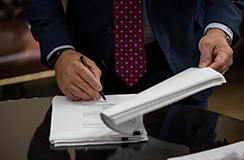The audit law (Louisiana Revised Statute 24:513 and 24:514) requires all local auditees to provide an annual financial report to the Louisiana Legislative Auditor (LLA). Local auditees in the state of Louisiana hire or engage a certified public accounting (CPA) firm that has been approved by LLA to perform the audit, review/attestation, or compilation engagement that results in the annual financial report that is submitted to LLA.
Being audited is a little like dental work – no one wants to have it done, it is sometimes painful, and it can be expensive. And like almost everything else, the cost of an audit continues to go up.
In order to keep audit costs down, local auditees must plan ahead and make it as easy as possible for the CPA to do his or her work in a timely manner. Here are some strategies to reduce the cost of your audit or other engagement.
1. Keep your books and records in good shape throughout the year. Hire competent staff or hire a CPA firm to keep your books -but bear in mind, the responsibility for maintaining a local auditee’s records lies with the management of the local auditee, no matter who keeps the books and records. Check periodically with the person keeping the books and records to make sure there are no problems that would delay or impede the audit.
2. Decide who will prepare your agency’s financial statements. If no one on your staff has the knowledge to prepare financial statements in accordance with generally accepted accounting principles, you will need to decide how that will be accomplished. One option is to hire the CPA firm that performs your audit or other engagement to prepare the financial statements. You may also hire another CPA firm knowledgeable about this type of work to prepare them.
3. Start early. Audit, review/attestation and compilation reports are due to LLA within six months after a local auditee’s year end. Although the audit law requires that a local auditee engage the services of a CPA within sixty days after the local auditee’s fiscal year end, the CPA firm the local auditee would like to hire may not be able to fit the local auditee’s engagement into their schedule if they wait that long to engage them. This is because CPA firms often have their staff scheduled out several months in advance. A local auditee should therefore start the process of procuring the services of the CPA at least two months before their fiscal year end, with the goal of having a signed engagement agreement before their fiscal year end. See Choosing A CPA Firm.
4. Consider bidding out your audit services. Although there is no state law requiring a local auditee to bid out its audit services, it is strongly recommended as an option to get a competitive cost for an audit. At the very least, a local auditee should get quotations for audit services from several CPA firms that are on LLA’s approved list. A local auditee that decides to bid out its audit services should start the process at least three months before the end of its fiscal year.
5. Know what the costs are up front. After a CPA is selected, the local auditee and the CPA will sign an agreement that spells out the terms and conditions of the engagement. One of those terms and conditions should be the estimated cost of the engagement. A local auditee should not sign an engagement agreement that does not include the estimated cost of the engagement. There should also be a provision in the engagement agreement that states any increase in fees will be discussed with the local auditee and agreed to in writing before the additional work is performed.
6. Get the list of records the CPA needs before commencement of the audit. The CPA should provide the local auditee with a list of documents and other information (e.g., general ledger, trial balance, support for funds received and expenditures made, bank and account reconciliations, payroll and personnel records, board minutes, policies and procedures manuals, etc.) needed for the audit. If the CPA does not provide this list, the local auditee should ask for it. These documents should be obtained and put together in an organized manner prior to the commencement of fieldwork. If you do not understand an item on the list, ask the CPA for clarification.
7. Talk to the CPA prior to the first day of fieldwork to coordinate the work to be performed with the records and personnel needed. Although the list of documents and other information mentioned previously is a good starting point, it should not be considered all-inclusive. The local auditee should assume that the CPA will request other documents during fieldwork, and will have questions that need to be answered.
8. The local auditee should designate a responsible person to be the contact person for the audit. This person should be available to the CPA as much as possible during the audit to answer questions and provide additional records. If the CPA has to stop work in one area because the local auditee’s personnel are not available to locate documents or answer questions, it may take him or her additional time to get back up to speed on the work already performed once the questions are answered. A CPA charges for the time spent on an audit, just as an attorney providing legal services would; and additional hours spent on an audit may result in additional costs to the local auditee.
9. After field work is complete, the local auditee should respond to the CPA’s requests for additional information; responses for findings, management letter comments, and exceptions noted, and corrective action plans for findings and management letter comments in a timely manner. This will ensure that your report is submitted to LLA by the statutory due date.
10. If you have followed these suggestions and still feel your audit fees are too high, talk to the CPA. There may be additional assistance you can provide to the CPA that will result in a lower fee. You may also want to contact other similarly sized agencies to see if the fees your CPA is charging are comparable to what other local auditees are being charged.
11. Be reasonable about the true cost of the audit engagement to the local auditee. A local auditee should keep in mind that an inexpensive audit is not necessarily a good audit, and may not result in savings to the local auditee. A CPA who charges more for his or her audit than other CPAs may also give valuable advice for improvements to the local auditee’s operations during the course of the engagement. If your agency cannot afford to hire a professionally trained financial person to oversee its day-to-day operations, the extra fees charged by the CPA firm may be money well spent.
Questions:
- Why are audit, review/attestation, and compilation engagements so expensive?
- Can LLA tell me how much a CPA firm should charge my agency for its audit?



